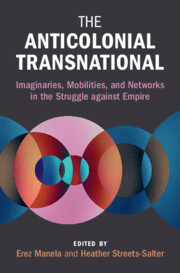Book contents
- The Anticolonial Transnational
- Global and International History
- The Anticolonial Transnational
- Copyright page
- Contents
- Figures
- Contributors
- Acknowledgments
- 1 Introduction
- Part I The Many Anticolonial Transnationals
- 2 Philippine Asianist Thought and Pan-Asianist Action at the Turn of the Twentieth Century
- 3 All Empires Must Fall: International Proletarian Revolution and the Anticolonial Cause in British India
- 4 Indoamerica against Empire: Radical Transnational Politics in Mexico City, 1925–1929
- 5 Carlos Romulo, Rotary Internationalism, and Conservative Anticolonialism
- Part II Solidarities and Their Discontents
- Part III Anticolonialism in a Postcolonial Age
- Index
3 - All Empires Must Fall: International Proletarian Revolution and the Anticolonial Cause in British India
from Part I - The Many Anticolonial Transnationals
Published online by Cambridge University Press: 10 August 2023
- The Anticolonial Transnational
- Global and International History
- The Anticolonial Transnational
- Copyright page
- Contents
- Figures
- Contributors
- Acknowledgments
- 1 Introduction
- Part I The Many Anticolonial Transnationals
- 2 Philippine Asianist Thought and Pan-Asianist Action at the Turn of the Twentieth Century
- 3 All Empires Must Fall: International Proletarian Revolution and the Anticolonial Cause in British India
- 4 Indoamerica against Empire: Radical Transnational Politics in Mexico City, 1925–1929
- 5 Carlos Romulo, Rotary Internationalism, and Conservative Anticolonialism
- Part II Solidarities and Their Discontents
- Part III Anticolonialism in a Postcolonial Age
- Index
Summary
This contribution details an early chapter in the long and complex history of the relationship of international socialism with anticolonial movements in British India. It tells a story of global intellectual interaction that informed and shaped international socialism as well as transnational anticolonialism between 1918 and 1924. It does so by highlighting a few aspects of this history. First, it discusses why radical anticolonialists gravitated towards international communism in the wake of the First World War. Second, it shows how the intersection between Marxist theory and anticolonial thought resulted in a capacious understanding of imperialism as a mode of capitalist production and organization of resources. Third, it illustrates how in interactions with radical anticolonialists from colonies like India, communists across the industrial world came to recognize national revolutionary movements as an integral part of the imminent world international revolution. Finally, it reveals the British colonial state’s anxiety about the rise of subversive ideas in the interwar years and its beleaguered response to this type of transnational anticolonialism.
- Type
- Chapter
- Information
- The Anticolonial TransnationalImaginaries, Mobilities, and Networks in the Struggle against Empire, pp. 41 - 63Publisher: Cambridge University PressPrint publication year: 2023

